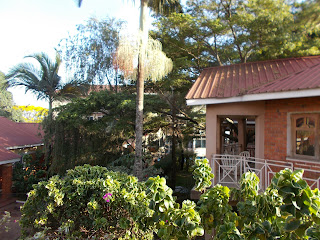Today we’ve
driven for 5 hours from Soroti to Kampala. We left a busy rural town with
dusty heat, where every child under 10
years old waves, and shouts ‘Muzungu, how are you?’, or this morning, ‘Muzungu
byee’. Women dress conservatively in
skirts that fall well below the knee. You leave a flat arid plain, pass through
swamps, towns of varying sizes, a jungle, cross the river Nile near its ‘Victorian’
source, see mountains in the distance… In my case you sleep a lot.
Finally, you
arrive in Kampala, which I can only describe as bonkers! A great sprawling
city, with modern high rise buildings and a commercial quarter, but also the familiar
pot-holed mud roads with tiny houses and shanty villages. No clear road. Its like an M25 traffic jam - only it’s the city centre and the cars are
moving at speed. Drivers play a game of ‘who
dares wins’ – only the weak give way. Some of the time I shut my eyes. I’m terrified for babies and children carried
on the backs of motorbikes by mothers sitting ‘side-saddle’. Some women wear
tight trousers, tight dresses and high heels. Around the pool at our hotel, men
and women are on sun-loungers in swimsuits. It is a bit of a culture shock.
Once again I
reflect that some things in Uganda don’t change – I can’t imagine Kampala with
respectful drivers and any kind of workable traffic control! But then as we
reach our hotel, I’m reminded of how much has changed since our first visit in
2008. The main highways are ‘proper’ tarmac
roads – not pot-holed, rutted expanses of orange rubble. People still drive on
the wrong side of the road, pedestrians and push-bikes share the space with
lorries, but there are marked areas for walking and cycling (even if no-one
sticks to them). Some hotels have wifi -
even the guest house in Soroti, and hot electric showers, and apart from in
Rukungiri, we’ve had power most of the time. I feel safe, I can go shopping on my own, we
can walk around on our own – we don’t need a Ugandan ‘minder’. There are more ‘posh’
4x4s, more two-story houses with painted verandas and formal lawns. Prices have
risen hugely. Our room prices have averaged an increase of 40% since last year,
and our meals in Rukungiri, 50% since 2012. Food prices, medical costs, school
fees, rent – all risen.
What hasn’t
risen, is pay for manual workers, or the rate of unemployment. Day workers still wait hours for the hope of a
day’s labour, the lucky ones working a gruelling day under the hot sun for the
equivalent of a few pence or maybe a pound. Enough for food, but not school
fees. We don’t begrudge supporting the tourist trade, we don’t mind paying more
for rooms and food. But… we wish the greater percentage of our money wasn’t
going to the rich people who own hotels and that staff wages had risen
accordingly.
I’m not
going to bang on again about the barefoot hungry children living in hovels, or
the disabled girl sleeping with her sister in an unstable outhouse. I just hope
that I can cause you to stop for a moment. Consider why it is that throughout
the world, rural communities are worse off than urban ones. What can I do to make sure I don’t keep getting
richer while the poor keep getting poorer? Is there anything you can do to
support families get access to clean water? Could you consider sponsoring a
child in Uganda? We don’t know how we’re going to respond to this trip. But we
know more than ever that this is who we are and what we do – we support the
work of Global Care. We’ve still got 2 days left. Tomorrow we’re visiting
Kampala schools, then joining the others at the conference. The one thing we do
know is that we can’t do everything, we mustn’t do nothing, we can do
something.
To understand the title, see: Where are you on the elephant?




No comments:
Post a Comment